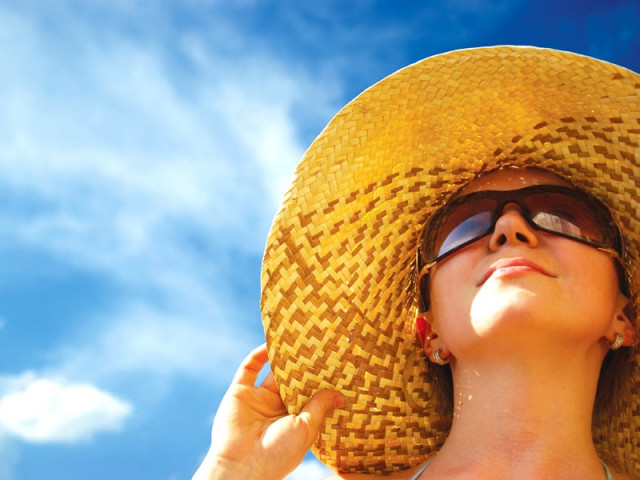Sunscreen: From luxury to necessity
Protection against the sun’s harmful ultraviolet rays.

The scorching heat of the sun leaves many of us exhausted, or what is even worse in Pakistan — tanned. As a result, we whip out our bottles of sunscreen in an attempt to shield ourselves against the harmful rays, but what about the other seasons of the year?
The sun emits ultraviolet (UV) radiation through three categories: UVA, UVB and UVC bands. Sunscreen protects your skin by absorbing and/or reflecting UVA and UVB radiation. The first effective sunscreen was developed by Austrian chemist Franz Greiter in 1938, and had a Sun Protective Factor (SPF) of two, but now all sunscreens have a SPF rating. The SPF rating indicates how long a sunscreen remains effective. A user can determine how long their sunscreen will be effective by multiplying the SPF factor by the length of time it takes for him or her to suffer a burn without sunscreen. Nowadays, dermatologists recommend sunscreens of SPF 30 or above.
The common perception that people with darker skin tones are not susceptible to damage by the sun’s rays is a myth. Although it is true that darker skin contains more melanin, therefore it may reduce the risk of skin cancer, brown skin is still susceptible to sun damage. Dr Khilji, a practicing dermatologist in Karachi, feels that sunscreen should be a daily part of our lives, and adjusted into our routine. “Just as we brush our teeth every morning, we must learn to have a mindset in which we apply sunscreen daily as it is the single most important thing for people living in temperate climates, such as those of South Asia.”
Another skin specialist, Mrs Humaira Ali Khan, owner of The Beautishape Clinic in Karachi says, “Eighty to 85 per cent of aging takes place because of the sun. Most of my patients who come for skin rejuvenation have had prolonged exposure to the sun which has caused damage.” Khan feels that, “Sunscreen is the single most important accessory a person must have. One should not limit its use to summer months only; it is necessary in every season as even in cloudy weather, 80 per cent of the sun’s rays are able to reach the earth’s surface.”
However, some sunscreens only protect against UVB radiation, and not against the more dangerous UVA radiation. Khilji explains how people with brown skin tones, such as those in Pakistan, are more susceptible to tanning, pigmentation and Melasma as compared to the fear of skin cancer in Caucasian people. “The most deadly rays for people with brown skin are UVA rays, which cause tanning. Most imported sunscreens offer protection from only UVB and UVC rays, since people with fairer skin tones want a tan and are more concerned about skin cancer. Therefore, in our region, before buying sunscreen, it is very important to read the labels. Only those sunscreens which guarantee protection from UVA rays are useful for people in Pakistan.”
He also described the new system of Protection Grade of UVA (PA) rating which refers to the amount of protection the sunscreen offers from UVA rays. PA ratings, which are usually used in Asia, are listed as PA+, PA++ or PA+++ — the more plus symbols, the more protection from UVA rays. Khilji stated that this is the most effective way to look for a sunscreen in Pakistan.
Some think that sunscreens are harmful as they block your pores and make one’s skin oily, but Khilji refutes the argument saying, “A brand is a brand. If you buy from a good brand such as Neutrogena or L’Oreal, it will not do you any harm. Also, options are available for all kinds of skin types. So you must choose according to your situation.”
Debunking myths about sunscreen
The higher the SPF level, the more effective the product
A high SPF level does not provide a significant amount of additional protection. SPF 30 sunscreen blocks 97 per cent of UVB rays, which is enough for most situations.
Apply once a day, and keep the suntan away
This statement is false. Sunscreen should generally be applied every two hours, and more regularly in situations where one is swimming or sweating a lot. Even water-resistant sunscreens may lose their effectiveness after 40 minutes in the water.
Stored bottles of
sunscreen last forever
Sunscreen loses its effectiveness after one year, and is mostly ineffective after three years. Unless you have an expiration date on your sunscreen, it is better to dispose them after two to three years.
A little dab of sunscreen works just fine!
The recommended amount to apply is a full palm or one ounce. It should be applied to dry skin 15 to 30 minutes before going outdoors to allow it to be absorbed into the skin.
Published in The Express Tribune, July 12th, 2011.



















COMMENTS
Comments are moderated and generally will be posted if they are on-topic and not abusive.
For more information, please see our Comments FAQ